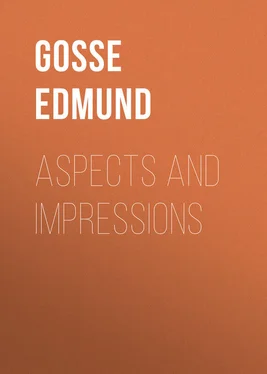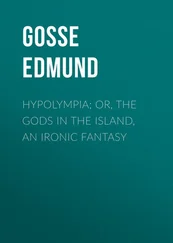Edmund Gosse - Aspects and Impressions
Здесь есть возможность читать онлайн «Edmund Gosse - Aspects and Impressions» — ознакомительный отрывок электронной книги совершенно бесплатно, а после прочтения отрывка купить полную версию. В некоторых случаях можно слушать аудио, скачать через торрент в формате fb2 и присутствует краткое содержание. Жанр: Критика, foreign_antique, foreign_prose, на английском языке. Описание произведения, (предисловие) а так же отзывы посетителей доступны на портале библиотеки ЛибКат.
- Название:Aspects and Impressions
- Автор:
- Жанр:
- Год:неизвестен
- ISBN:нет данных
- Рейтинг книги:4 / 5. Голосов: 1
-
Избранное:Добавить в избранное
- Отзывы:
-
Ваша оценка:
- 80
- 1
- 2
- 3
- 4
- 5
Aspects and Impressions: краткое содержание, описание и аннотация
Предлагаем к чтению аннотацию, описание, краткое содержание или предисловие (зависит от того, что написал сам автор книги «Aspects and Impressions»). Если вы не нашли необходимую информацию о книге — напишите в комментариях, мы постараемся отыскать её.
Aspects and Impressions — читать онлайн ознакомительный отрывок
Ниже представлен текст книги, разбитый по страницам. Система сохранения места последней прочитанной страницы, позволяет с удобством читать онлайн бесплатно книгу «Aspects and Impressions», без необходимости каждый раз заново искать на чём Вы остановились. Поставьте закладку, и сможете в любой момент перейти на страницу, на которой закончили чтение.
Интервал:
Закладка:
And it is all so earnest and so intellectual, and it does so much credit to Sylvester. After long consideration, I have come to the conclusion that the following sonnet, from Brother and Sister, is the best piece of sustained poetry that George Eliot achieved. It deals with the pathetic and beautiful relations which existed between her and her elder brother Isaac, the Tom Tulliver of The Mill on the Floss:
His sorrow was my sorrow, and his joy
Sent little leaps and laughs through all my frame;
My doll seemed lifeless, and no girlish toy
Had any reason when my brother came.
I knelt with him at marbles, marked his fling,
Cut the ringed stem and made the apple drop,
Or watched him winding close the spiral string
That looped the orbits of the humming-top.
Grasped by such fellowship my vagrant thought
Ceased with dream-fruit dream-wishes to fulfil;
My aëry-picturing fantasy was taught
Subjection to the harder, truer skill
That seeks with deeds to grave a thought-tracked line,
And by "What is" "What will be" to define.
How near this is to true poetry, and yet how many miles away!
At last George Eliot seems to have felt that she could never hope, with all her intellect, to catch the unconsidered music which God lavishes on the idle linnet and the frivolous chaffinch. She returned to her own strenuous business of building up the psychological novel. She wrote Middlemarch , which appeared periodically throughout 1872 and as a book early the following year. It was received with great enthusiasm, as marking the return of a popular favourite who had been absent for several years. Middlemarch is the history of three parallel lives of women, who "with dim lights and tangled circumstances tried to shape their thought and deed in noble agreement," although "to common eyes their struggles seemed mere inconsistency and formlessness." The three ineffectual St. Theresas, as their creator conceived them, were Dorothea, Rosamond, and Mary, and they "shaped the thought and deed" of Casaubon and Ladislaw and Fred Vincy. Middlemarch is constructed with unfailing power, and the picture of commonplace English country life which it gives is vivacious after a mechanical fashion, but all the charm of the early stories has evaporated, and has left behind it merely a residuum of unimaginative satire. The novel is a very remarkable instance of elaborate mental resources misapplied, and genius revolving, with tremendous machinery, like some great water-wheel, while no water is flowing underneath it.
When a realist loses hold on reality all is lost, and I for one can find not a word to say in favour of Daniel Deronda , her next and last novel, which came out, with popularity at first more wonderful than ever, in 1876. But her inner circle of admirers was beginning to ask one another uneasily whether her method was not now too calculated, her effects too plainly premeditated. The intensity of her early works was gone. Readers began to resent her pedantry, her elaboration of allusions, her loss of simplicity. They missed the vivid rural scenes and the flashes of delicious humour which had starred the serious pages of Adam Bede and The Mill like the lemon-yellow pansies and potentillas on a dark Welsh moor. They regretted the ease of the conversation in her early books, where it had always been natural, lively, and brief; it was now heavy and doctrinaire. Tennyson rebelled against the pompousness, and said, in his blunt way, that Jane Austen knew her business better, a courageous thing to say in Victorian circles fifty years ago. Then came Theophrastus Such , a collection of cumbrous and didactic essays which defy perusal; and finally, soon after her death, her Correspondence , a terrible disappointment to all her admirers, and a blow from which even the worship of Lord Acton never recovered. Of George Eliot might have been repeated Swift's epitaph on Sir John Vanbrugh:
Lie heavy on him, earth, for he
Laid many a heavy load on thee.
It was the fatal error of George Eliot, so admirable, so elevated, so disinterested, that for the last ten years of her brief literary life she did practically nothing but lay heavy loads on literature.
On the whole, then, it is not possible to regard the place which George Eliot holds in English literature as so prominent a one as was rather rashly awarded her by her infatuated contemporaries. It is the inevitable result of "tall talk" about likeness to Dante and Goethe that the figure so unduly magnified fails to support such comparisons when the perspective is lengthened. George Eliot is unduly neglected now, but it is the revenge of time on her for the praise expended on her works in her lifetime. Another matter which militates against her fame to-day is her strenuous solemnity. One of the philosophers who knelt at the footsteps of her throne said that she was "the emblem of a generation distracted between the intense need of believing and the difficulty of belief." Well, we happen to live, fortunately or unfortunately for ourselves, in a generation which is "distracted" by quite other problems, and we are sheep that look up to George Eliot and are not fed by her ponderous moral aphorisms and didactic ethical influence. Perhaps another generation will follow us which will be more patient, and students yet unborn will read her gladly. Let us never forget, however, that she worked with all her heart in a spirit of perfect honesty, that she brought a vast intelligence to the service of literature, and that she aimed from first to last at the loftiest goal of intellectual ambition. Where she failed, it was principally from an inborn lack of charm, not from anything ignoble or impure in her mental disposition. After all, to have added to the slender body of English fiction seven novels the names of which are known to every cultivated person is not to have failed, but to have signally, if only relatively, succeeded.
HENRY JAMES
VOLUMINOUS as had been the writings of Henry James since 1875, it was not until he approached the end of his career that he began to throw any light on the practical events and social adventures of his own career. He had occasionally shown that he could turn from the psychology of imaginary characters to the record of real lives without losing any part of his delicate penetration or his charm of portraiture. He had, in particular, written the Life of Hawthorne in 1879, between Daisy Miller and An International Episode ; and again in 1903, at the height of his latest period, he had produced a specimen of that period in his elusive and parenthetical but very beautiful so-called Life of W. W. Story . But these biographies threw no more light upon his own adventures than did his successive volumes of critical and topographical essays, in which the reader may seek long before he detects the sparkle of a crumb of personal fact. Henry James, at the age of seventy, had not begun to reveal himself behind the mask which spoke in the tones of a world of imaginary characters.
So saying, I do not forget that in the general edition of his collected, or rather selected, novels and tales, published from 1908 onwards, Henry James prefixed to each volume an introduction which assumed to be wholly biographical. He yielded, he said, "to the pleasure of placing on record the circumstances" in which each successive tale was written. I well recollect the terms in which he spoke of these prefaces before he began to write them. They were to be full and confidential, they were to throw to the winds all restraints of conventional reticence, they were to take us, with eyes unbandaged, into the inmost sanctum of his soul. They appeared at last, in small print, and they were extremely extensive, but truth obliges me to say that I found them highly disappointing. Constitutionally fitted to take pleasure in the accent of almost everything that Henry James ever wrote, I have to confess that these prefaces constantly baffle my eagerness. Not for a moment would I deny that they throw interesting light on the technical craft of a self-respecting novelist, but they are dry, remote, and impersonal to a strange degree. It is as though the author felt a burning desire to confide in the reader, whom he positively button-holes in the endeavour, but that the experience itself evades him, fails to find expression, and falls stillborn, while other matters, less personal and less important, press in and take their place against the author's wish. Henry James proposed, in each instance, to disclose "the contributive value of the accessory facts in a given artistic case." This is, indeed, what we require in the history or the autobiography of an artist, whether painter or musician or man of letters. But this includes the production of anecdotes, of salient facts, of direct historical statements, which Henry James seemed in 1908 to be completely incapacitated from giving, so that really, in the introductions to some of these novels in the Collected Edition, it is difficult to know what the beloved novelist is endeavouring to divulge. He becomes almost chimæra bombinating in a vacuum.
Читать дальшеИнтервал:
Закладка:
Похожие книги на «Aspects and Impressions»
Представляем Вашему вниманию похожие книги на «Aspects and Impressions» списком для выбора. Мы отобрали схожую по названию и смыслу литературу в надежде предоставить читателям больше вариантов отыскать новые, интересные, ещё непрочитанные произведения.
Обсуждение, отзывы о книге «Aspects and Impressions» и просто собственные мнения читателей. Оставьте ваши комментарии, напишите, что Вы думаете о произведении, его смысле или главных героях. Укажите что конкретно понравилось, а что нет, и почему Вы так считаете.












